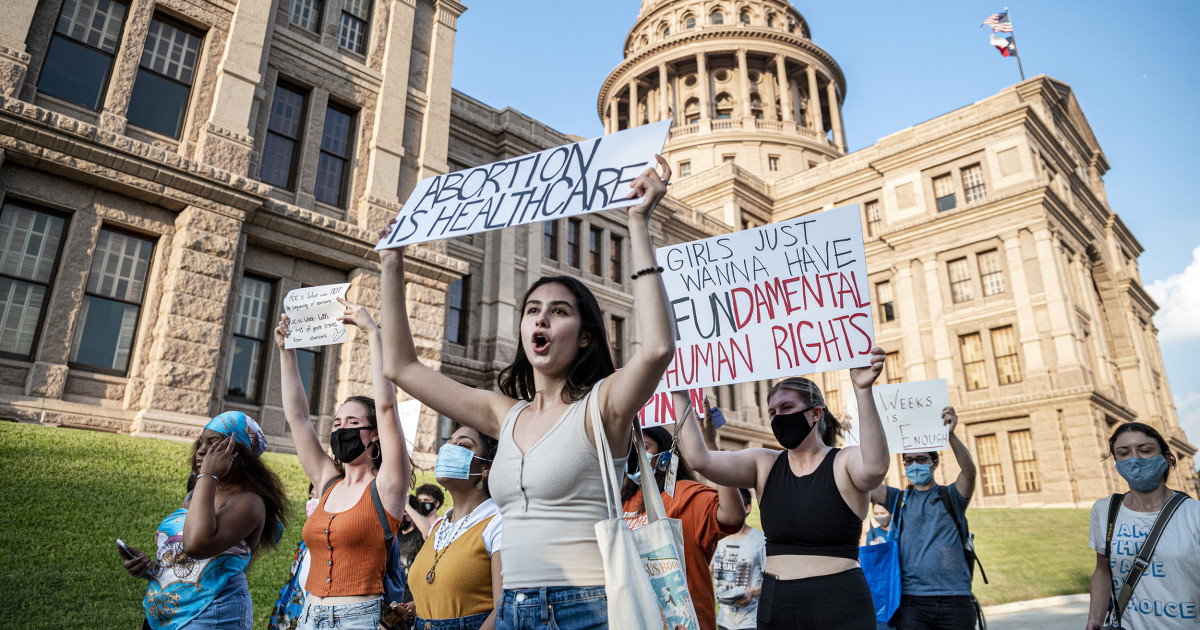
Lawyers for the Justice Department appeared in federal court on Friday to ask a judge to block Texas’s restrictive abortion law, arguing it’s “in open defiance of the Constitution.”
“The statute prohibits most pre-viability abortions, even in cases of rape, sexual abuse or incest. It also prohibits any effort to aid – or, indeed, any attempt to aid – the doctors who provide pre-viability abortions or the women who exercise their right to seek one,” and should be immediately blocked, DOJ lawyers contended in court papers.
Lawyers for the Texas Attorney General’s office maintain the law is constitutional, and asked the judge presiding over the hearing in Austin, Robert Pitman, to deny the request for a preliminary injunction. They contend an unusual and controversial aspect of the law that effectively puts enforcement in the hands of private citizens instead of state officials raised additional legal hurdles that the feds haven’t cleared in their court filings.
“The federal government’s complaint is that the Heartbeat Act is difficult to effectively enjoin,” the state’s court filings say. “But there is no requirement that a state write its laws to make them easily enjoined.”
After hearing hours of arguments in the case Friday, Pitman said he would issue a decision at a later date and did not indicate how he will rule.
“I will take this under advisement” and “get to work on the appropriate order in this case,” the judge said.
During the hearing, Pitman repeatedly asked questions on how an injunction would need to be structured, given the unusual nature of the Texas law, known as S.B. 8.
The law bans abortions from around six weeks of pregnancy, before many women know they are pregnant. It is enforced through private citizens’ lawsuits against abortion providers rather than through state government. The first-of-its-kind language allows anyone, even those outside the state, to sue abortion providers or others who help women get abortions after the six-week limit and seek $10,000 per defendant.
Asked what the state would be obligated to do if there was an injunction, Will Thompson of the attorney general’s office told the judge, “Honestly, I’m not sure.”
DOJ lawyer Brian Netter told the judge “It doesn’t take a lot of reading between the lines to see what the state’s objectives were.”
“Texas was looking for a way to object to the way the Supreme Court has interpreted the constitution and to effectuate an unconstitutional policy without needing to answer to the courts,” Netter said.
As of evidence of the law’s impact, the Justice Department included a declaration from Amy Miller, the president and chief executive officer of Whole Woman’s Health, LLC and Whole Woman’s Health Alliance, who said, “Every day that S.B. 8 is in effect we turn away patients in droves.”
“Most patients that call for appointments are already so far past S.B. 8’s limit that we cannot help them, and we turn them away before they even come into the clinic,” she said.
The Justice Department filed the case, the United States of America vs. the State of Texas, last month, after the U.S. Supreme Court denied a request to block it from taking effect.
The court’s 5-4 decision said that abortion providers who’d challenged the law “have raised serious questions regarding the constitutionality of the Texas law,” but those arguments did not adequately address “complex and novel” procedural questions presented by the case.
Daniel Barnes contributed.
Source: | This article originally belongs to Nbcnews.com









